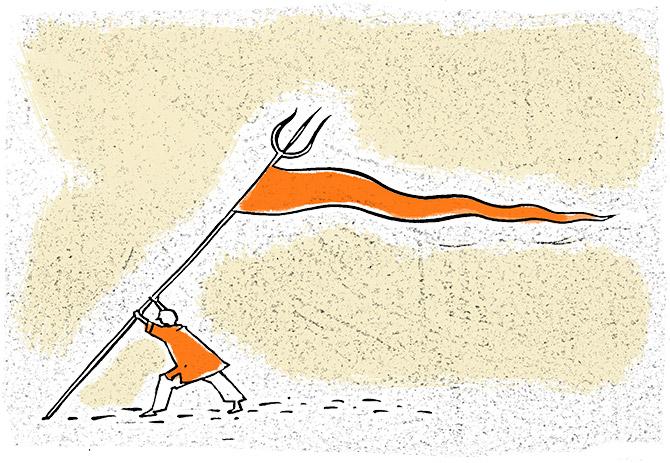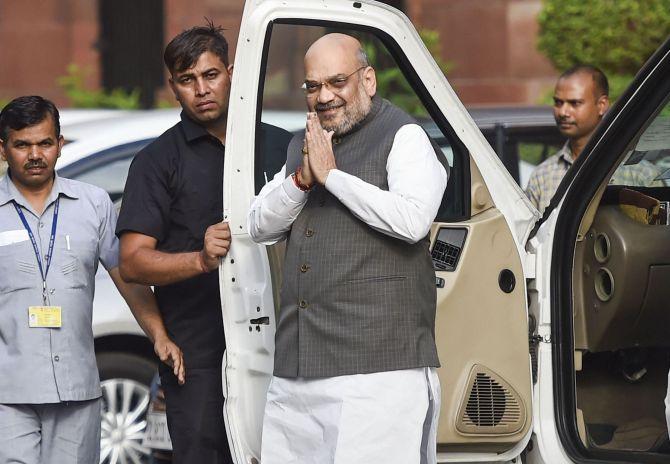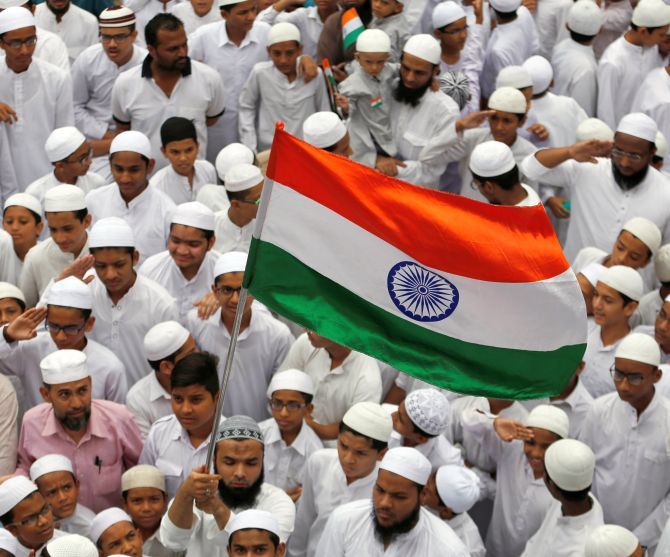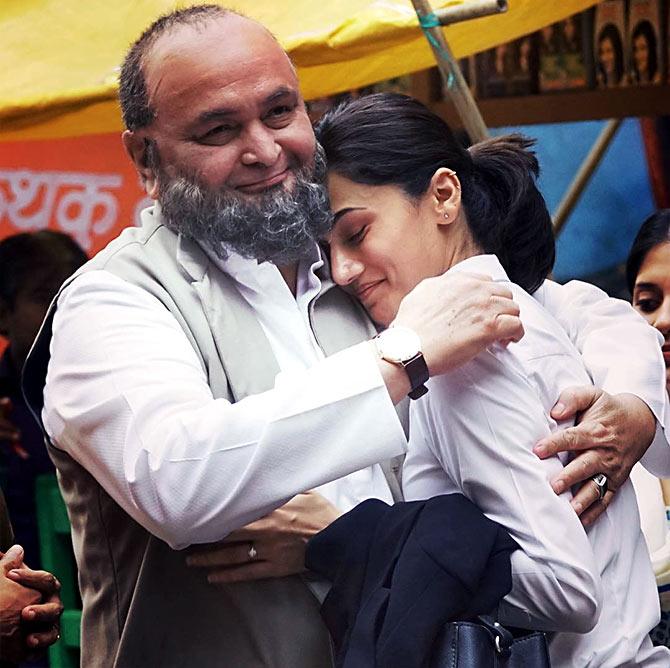 | « Back to article | Print this article |
This theory of 'Hindus vs the rest' sees the two communities as two separate blocs.
Isn't that the two-nation theory?
What of the deep bonds that the communities have on the ground? asks Jyoti Punwani.
Illustration: Dominic Xavier/Rediff.com

The attacks on Muslims and a Hindu immediately after the results, and the experience of a Hindu doctor in Delhi who was ordered to say 'Jai Sri Ram', would indicate this.
So would the choice of some Cabinet ministers.
In fact, just one Cabinet appointment would suffice.
The man who had threatened to implement the National Register of Citizens across the country, and had raised the slogan 'Jai Sri Ram' at his election rally in Kolkata, is now the country's home minister.
Old-timers remember 'Jai Sri Ram' as the Hindu war cry during the Ayodhya movement of the late 1980s and early 1990s.
That movement, aimed at demolishing the centuries-old Babri Masjid and replacing it with a Ram temple, saw the beginning of the aggressive Hindu.
This is not the first time in India's history that Hindutva is being manifested so strongly, but at that time, it didn't feature in the government as it does now.
However, the 'secular' Congress government then simply looked on as Hindutva mobs went on the rampage.
But let's not forget that the frightening trishul-wielding creature of the Ayodhya movement disappeared in the early 1990s, only to be resurrected in Gujarat in 2002.
He remained confined to that state (except for a brief appearance in Odisha and Kashmir in 2008), till the man who presided over his resurrection moved to the Centre.
Today, after five years of Modi rule, and a long drawn out election fought by pitting Hindus against the minorities, the aggressive Hindu is back with a bang.
This time, though, he is armed not with a trishul, but with a smart phone.
If, as The Hindu CSDS-Lokniti post-poll survey says, 'Hindu consolidation' brought Modi back to power, one reason for such consolidation was the continuous barrage of propaganda on thousands of WhatsApp groups in the months preceding the election.
Apart from portraying Modi as a Hindu Superman, these messages demonised Muslims, and identified the Opposition parties, specially the Congress and Mamata Banerjee, as Muslim.
Even the veteran journalist N Ram, who came out with a series on the Rafale deal, was said to be a Muslim!
In sum, anyone who opposed Modi had to be Muslim.
Yet, the question must be asked: Were all Hindus who voted for Modi motivated by Muslim hatred?
To assume that would be to blind ourselves to the other factors that contributed to Modi's win, which were described at length in media reports from the ground.

The myth, created after Pulwama and Balakot, that Modi was the only PM who had the guts to take on Pakistan; the careful caste-based choosing of beneficiaries of welfare schemes viz toilets, gas cylinders and houses in the crucial state of UP; the cleverly timed payment of Rs 2000 under the PM Kisan Yojna to an important and very angry section of voters -- all of this worked.
Then there were the poll alliances made by the BJP even at the cost of eating humble pie or giving up its own seats.
Alliances with smaller parties based on caste or other considerations of identity were carefully worked out.
In brief, the BJP was driven; the Opposition was not.
Of course, it didn't have the BJP's resources, including the State machinery.
But it didn't even try to make do with what it had.
303 seats for Modi (his campaign speeches made it clear that every vote was for him) were unexpected, but media reports showed clearly that the National Democratic Alliance would be able to form the government on its own.
Hence it's difficult to understand the shock that set in on May 23 among those who oppose Modi.
What made them think he would lose?
***

Since the results, there has been a deluge of doomsday predictions of the 'end of India as we have known it'.
The picture being projected is of a country where, as the majority celebrates its triumph, minorities, specially Muslims, look on in fear and dread to a future where they will be forced to cast off their identity markers and live like outcastes at the mercy of a brute majority.
This picture is not India -- not even Modi's India.
Many Muslims blame this interpretation for making them feel even more isolated.
"The Lokniti-CSDS survey does more harm than good to the minority community, it increases the prejudices against them. Knowingly or unknowingly, the media has concertedly worked towards burying the Muslim by judging their silence," says A Faiz, a Chennai professional angrily.
Muslims are also questioning the media for running to Asaduddin Owaisi for his comments on every issue concerning Muslims, as if he is their only spokesman.
"The community's sane voices are never engaged in a debate," complains Faiz.
"It's either firebrand Muslim radicals or some mullah whose only job is to make it more difficult for Muslims to justify his views. He is cannon fodder for the TV channels."
"Till such time as a spokesperson surfaces who gives a truly balanced view on Muslim aspirations from the political class," continues Faiz, "we need to suffer Owaisi's eloquence."
In the 1980s, the Shahi Imam used to be the media's 'Muslim voice'.
At that time, too, Muslims were repulsed by the sight of that opportunist.
But today, many Muslims, specially the youth, feel proud that their spokesman is a Barrister who can quote the Constitution in their defence.
On the ground, though, Owaisi's politics is a mirror image of the BJP's.
For both, religious identity equals political identity.
Owaisi's party workers celebrated his candidate Imtiyaz Jaleel's victory in Aurangabad as a victory of 'green' in a sea of saffron.
On WhatsApp, again mirroring the BJP, AIMIM workers plant the idea in Muslim minds that the Hindus hate them.
So overwhelmed are some Muslims by this picture of their entire community being terrorised by a 'Hindu State', that they see only two alternatives left for them: Withdrawing into their ghettos because 'no secular party has ever cared for us', or, jihad'.
Some are blaming themselves for not being 'better Muslims', others for hating Modi too much.
Despite the PM's silence on the attacks since the results, some Muslims feel his 'sabka vishwas' assurance needs to be taken seriously.
All this would be music to the BJP's ears.
Viewing the election results simply in terms of Hindus and the rest is precisely what the BJP wants.
Apart from the damage this interpretation does, the picture it paints is gravely fallacious.
It takes India to be one uniform whole.
It ignores the BJP's rout in four states where also, like in the rest of India (except Jammu and Kashmir), Hindus are the majority.
Secondly, it assumes that no Hindu voted for the Opposition.
Do the Hindus of states as culturally and historically different as Punjab, Andhra Pradesh, Kerala and Tamil Nadu have some unique psyche completely at variance with Hindus in the rest of India?
We should note that Jagan Reddy, who swept Andhra, is a Christian as was his father, the popular Y S Rajasekhara Reddy.
Stalin is an atheist.
Amarinder Singh is a Sikh.
Yet, lakhs of Hindus voted for them.
Similarly, did no Hindu vote for Mamata Banerjee in the 22 seats she won out of 42? Across the country, did all losing Congress, NCP, TDP, CPI-M and AAP candidates get only Muslim votes?
**

This theory of 'Hindus vs the rest' sees the two communities as two separate blocs.
Isn't that the two-nation theory? What of the deep bonds that the communities have on the ground?
Two days after the election, a Jain attended an inter-faith iftar in a Mumbai suburb.
His mother is a regular at a dargah in Kutch; he himself wishes his close Muslim friends with a Salaam Alaikum and they greet him with 'Jai Jinendra'.
Every month, he organises a blood donation camp in his Jain derasar where Muslims also volunteer.
This man voted for the BJP.
Amid the bitter political discussions on a WhatsApp group of retired professionals, a 'Tam-Bram' who voted for Modi shared a photograph of a Murugan temple in Puducherry built in 1970 by a Muslim, and still being looked after by his son.
"The media blows up the differences," says this researcher, whose travels take her to temples across the country.
"On the ground, I see both communities intermingling routinely."
Proof of that was evident in Marathwada's villages this reporter visited during the election campaign.
Hindus and Muslims sat in the same house, talking about the common woes they faced.
Some Hindu farmers said they would give Modi a second chance, because the Congress was nowhere on the ground.
But their choice didn't affect their relationship with Muslims.
Perhaps the most heartening evidence that the communal divide hasn't enveloped all Hindus came at the height of the election season: The slow but steady exit from 'PM MODI 2019' WhatsApp groups of Hindus who had joined these groups voluntarily.
Indeed, after the PM's 'sab ka vishwas' speech in Parliament, for the first time, one member reprimanded others on one such group for their usual venomous references to Muslims.
Of course, he suffered the fate of Gautam Gambhir, but like the cricketer, he too didn't back down.
There's more such evidence -- and this reporter has been fortunate enough to come across it often.
A report on how the beef ban had adversely affected those connected to the trade in Mumbai, drew a response from two Hindu readers.
They wanted to fund the education of four children who, said the report, had had to be withdrawn from private schools thanks to the sudden drop in their fathers's earnings after the beef ban.
It took months, yet, the two Hindu women persisted till those children had got admission in schools of their parents' choice.
One of those schools was an Islamic school, yet, the donor, a Gujarati Hindu, stuck to her resolve.
A similar offer of help came from a Hindu reader after the Rediff story on a Muslim teenager left paralysed by a police bullet during a riot in Aurangabad.
Last year, another report on a Muslim victim of the 1992-1993 riots, who, even 25 years later, had to run from pillar to post to pay for her angioplasty, moved an anonymous Hindu donor to pay the victim's huge medical bill.
These Hindus didn't neither knew the author of the articles nor did they wish to be known to the recipients of their generosity.
Are these just stray 'goody goody' stories?
What about the hospitality shown by temples in Marathwada in February 2018, and near Bulandhshahr in December, to Muslims returning from an ijtema?
Right in the middle of these Lok Sabha election campaign, the Shri Sita Ram temple in Ayodhya hosted an iftar on its premises -- the third consecutive year it was doing so.
In Delhi, two Hindu fathers whose sons were killed by Muslims ensured that the murders were not communalised.
Hindutva organisations tried their best, but the families of Ankit Saxena, killed by his Muslim girl friend's parents in February 2018, and Dhruv Tyagi, killed in April this year when he protested about his daughter's molestation, refused to make these killings a Hindu-Muslim issue.
Yashpal Saxena even held an iftar for his neighbours four months after Ankit, his only son, was killed.
He attended RSS shakhas as a youth, and has always voted BJP.
Are all these exceptions?
Many Muslims do not think so.
"Even if the RSS (Rashtriya Swayamsevak Sangh) tries its best, they cannot isolate us. Our businesses are interdependent with Hindus," said businessman Sajid Shaikh.
Akif Dafedar, a political activist known for his lectures on Shivaji, described the current situation as a "phase of hatred that will pass."
"The innocent Hindu has been made to believe he is being oppressed by us," said Dafedar.
"Once this euphoria about 'Iron Man Modi' dies out, and he goes to the market to buy vegetables and dal, he will be confronted with the same reality of high prices that his Muslim neighbour faces."
Said an ex-SIMI activist now in his 50s, "Extremism will always remain confined to 20% to 30% of the people, be they Hindu or Muslim. Ask me, I have personal experience."
Across the political spectrum, one common reaction was: "What can the BJP do to us? We are 20 crore."
"Look around you," said Shaikh.
"Aren't the streets full of Muslims celebrating Ramzan? People underestimate the faith we have that Allah will look after us."
Whatever the BJP can or cannot do to 20 crore Indians, those who want to counter the party's plans have their work cut out.
Instead of bemoaning the death of the 'idea of India', they need to put it into practice by reaching out to the other community.
As always, it's the majority's responsibility to do so.